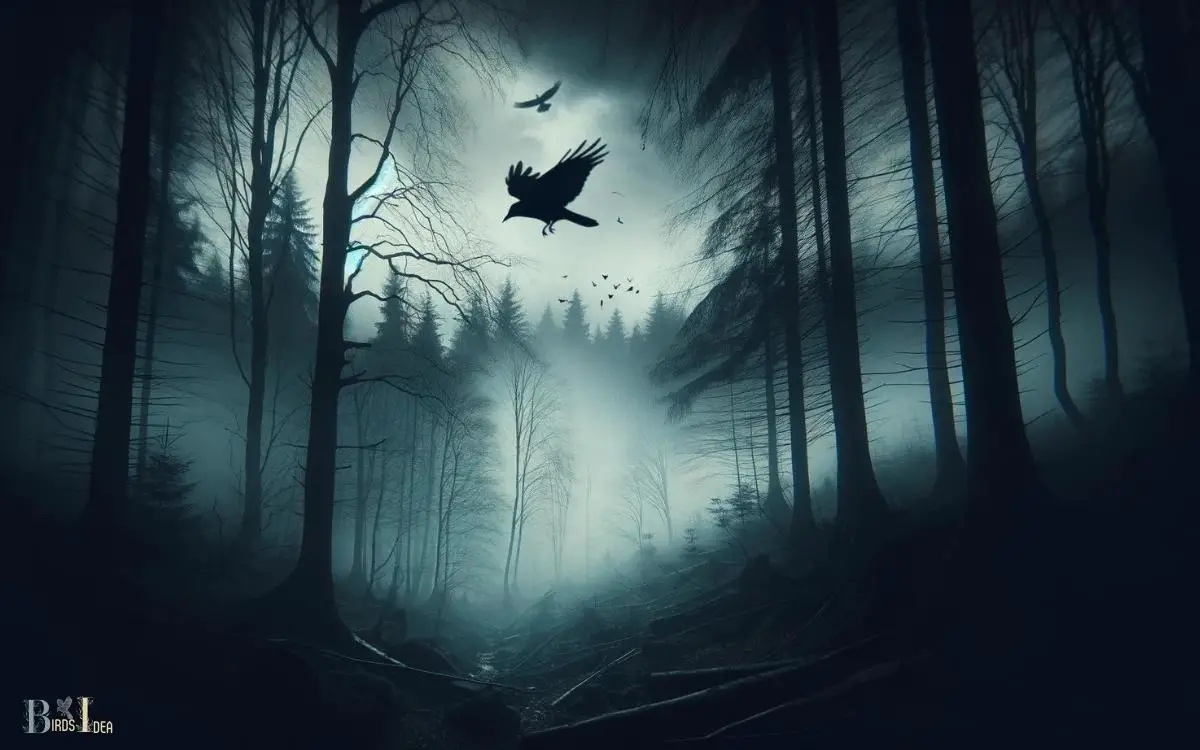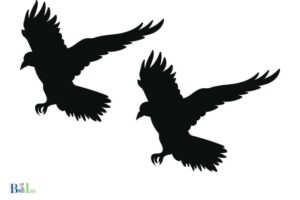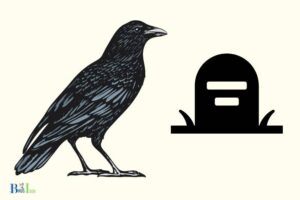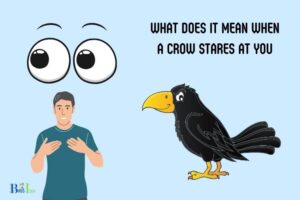What Does It Mean If You Kill a Crow? Discover!
Killing a crow is often seen as an act with negative connotations due to the bird’s symbolism across various cultures.
Crows are deeply embedded in mythology and folklore, where they are frequently connected to themes of death, the afterlife, and prophetic insight.
Their intelligence and complex social behaviors have also contributed to their mystical status.
The killing of a crow can evoke a sense of unease or guilt, possibly due to the bird’s revered status in numerous cultural narratives and its admired intelligence and adaptability in the natural world.

Symbolism of Crows In Different Cultures
Crows are highly intelligent animals that are often found in different cultures, and therefore, they have spiritual significance for different societies.
Some cultures believe that crows are a symbol of good luck, while others view them as bad omens.
Crows In Native American Culture
Native Americans view crows with powerful spiritual significance. They’re messengers and land protectors in their culture.
Here are some important aspects that native Americans associate with crows:
- Crows are believed to be the keepers of sacred law, and as such, they have a close association with the spiritual world.
- According to native American beliefs, crows have an important role in the transition of human souls from the physical world to the spiritual world.
- Some native American tribes see crows as tricksters who have the power to manipulate the physical world.
Crows In Asian Culture
In Asia, crows are seen as both good and bad omens. Some see them as symbols of good luck, while others consider them bad omens.
Here are some beliefs related to crows in Asian culture:
- In japan, crows are considered to be a symbol of good luck. They are also believed to be the messengers of the gods.
- The Chinese view crows as a symbol of bad luck, and it is believed that if a crow caws at your door, it is an indication that someone in your family will die soon.
- Hindus believe that crows are the messengers of the god of death, Yama.
Crows In European Culture
Crows have long been associated with death and the supernatural in European culture. They have also been associated with dark magic and witches.
- In Celtic mythology, crows are seen as messengers from the gods who connect the living world with the world of the dead.
- In medieval Europe, crows were believed to be witches’ familiars. It was believed that witches could take on the form of a crow to spy on people in the village.
- In western art, crows are often depicted as a symbol of death.
Crows In African Culture
In many African regions, crows symbolize death and bad luck, serving as messengers of evil spirits.
- In south Africa, it is believed that if a crow flies over your house while cawing, it is a sign of impending death.
- Many African tribes believe that crows are messengers between the living world and the underworld.
- In some African cultures, crows are believed to be the protectors of sacred places.
Crows are seen differently across the world, and it is important to understand each culture’s perspective of these intelligent birds.
Killing A Crow In Different Cultures
Crows hold diverse symbolism in global mythology and folklore. Some cultures link them to death or bad luck, making killing them taboo.
Killing A Crow In Native American Culture
In Native American culture, killing a crow is considered very bad luck, as they are believed to be messengers of the spirits.
According to legend, if a crow flies into a home, it is thought to signal a death or tragedy is impending.
- Killing a crow in native American culture is believed to bring serious harm to the person who does it. They believe that killing a crow will bring bad luck to the killer, and possibly their entire community.
- The crow is revered as a sacred creature in many native American tribes and is often seen as a symbol of power, intelligence, and protection.
- The killing of a crow is considered an act of disrespect towards the spirits, and it is believed that the killer will pay a price for this blasphemy.
Killing A Crow In Asian Culture
In certain Asian cultures, crows are seen as bad omens, heralding death and disaster. While not sacred, killing a crow is still significant in these cultures.
- In Chinese mythology, crows are associated with ghostly spirits and are thought to be a sign of bad news.
- According to Japanese folklore, crows are messengers of the gods and are believed to have the power to communicate with the dead. Killing one is thought to bring serious misfortune upon the person who does it.
- In Hindu mythology, crows are considered sacred animals that are closely associated with the god shani, the lord of karma and fate. Killing a crow is regarded as a grave sin and is believed to bring terrible luck and misfortune.
Killing A Crow In European Culture
In ancient times, they were believed to have supernatural powers and were often seen as messengers of the gods.
- In Celtic mythology, crows are associated with the goddess Morrigan, the goddess of war, death, and prophesy. Killing a crow is considered to be a serious blasphemy that is believed to anger the goddess and bring harm upon the person who does it.
- In medieval Europe, crows were often seen as a symbol of evil and were believed to be the companions of witches and other supernatural creatures.
Killing A Crow In African Culture
Many African cultures hold crows in high regard as symbols of intelligence, resourcefulness, and wisdom. Killing a crow is seen as taboo in these cultures.
- In some African cultures, crows are associated with the spirits of the ancestors and are believed to be their messengers. Killing a crow is seen as an act of disrespect towards the ancestors and is believed to bring misfortune.
- In some south African tribes, crows are regarded as protectors of the village and are believed to have powerful magic that can ward off evil spirits. Killing a crow is believed to nullify this magic, putting the village at risk.
Cultural views on crows vary, from taboo to signs of doom. Awareness of their significance is crucial, respecting and revering them accordingly.
Superstitions Related To Killing A Crow
Killing crows is steeped in superstitions and beliefs. Birds, particularly crows, have been both revered and feared across many cultures in history.
The Belief That Killing A Crow Brings Bad Luck
Many believe that if you kill a crow, you will experience bad luck. This superstition is not only popular in modern times, but it has been around for centuries.
- Crows are often associated with death and misfortune.
- Crows are considered intelligent birds, and some believe that they have the ability to bring good fortune.
- Killing a crow is believed to sever a connection with the divine, leading to a loss of protection and luck.
The Belief That Killing A Crow Is A Sign Of Disrespect Towards The Divine
Crows have always held a particular status in religious texts and beliefs, from being messengers of the divine to holding a place in various mythologies.
Here are some reasons why:
- Crows are associated with deities and are considered divine creatures.
- Killing a crow is believed to be a direct attack on the divine.
- In some cultures, crows are thought to be the physical manifestation of a deity, and killing one could anger the divine.
The Belief That Killing A Crow Results In A Curse
Curses are a common belief across cultures and are often linked to supernatural events. Killing a crow is no exception.
- Crows are considered messengers of the spirit world, and killing one could bring a curse upon the killer.
- In some cultures, the spirit of the crow is believed to haunt and torment the one who killed it.
- The curse could lead to bad luck, illness, and other negative outcomes.
Killing crows can lead to bad luck, divine disrespect, or even curses. Awareness of their significance in diverse cultures helps us understand why they are both revered and feared.
The Consequences Of Killing A Crow
What Does It Mean If You Kill A Crow?
Fines And Penalties
- Killing a crow is considered a violation of federal law, as they are protected by the migratory bird treaty act. This act was created to protect all migratory birds, including crows, from harm.
- The penalties for killing a crow can be severe. Fines can range from $15,000 to $200,000, and jail time can be up to two years.
- Those who are caught killing crows can face criminal charges, which can impact their future employment and personal life.
- Crow populations are essential to a healthy ecosystem, and killing them can disrupt the natural balance of agriculture and urban environments.
Legal Repercussions
- In addition to federal law, many states have their own laws regarding the hunting or killing of crows.
- In some states, a permit is required to hunt or kill crows, and violations can result in fines and other penalties.
- It’s essential to research and understand the laws in your state before attempting to kill a crow.
- Ignorance of the law is not a valid excuse, and those who break the law may be subject to legal action.
Killing a crow can result in severe fines and legal repercussions. Not only is it illegal, but it can also disrupt the ecosystem and harm the environment.
It’s crucial to understand the laws regarding crows in your state and avoid any actions that may harm them.
Remember, it’s always better to admire these intelligent and fascinating birds from a distance.
Environmental Impact of Killing A Crow
Ecological Role of Crows in Maintaining Balance in Ecosystems:
Crows play a crucial role in maintaining ecological balance in various ways:
Carrion Removal
Crows are scavengers and play a vital role in cleaning up carrion (dead animals). By consuming carcasses, they help prevent the spread of diseases and reduce the presence of decaying matter in the environment.
Seed Dispersal
Crows are opportunistic feeders, and they contribute to seed dispersal by caching and sometimes forgetting about seeds they’ve collected. This aids in the regeneration of plant species and promotes biodiversity.
Predator Regulation
Crows are known to prey on insects, small mammals, and even other birds. This predation helps control the populations of certain species, preventing overpopulation that could disturb the balance of the ecosystem.
Intelligence and Adaptability
Crows are highly intelligent and adaptable birds. Their problem-solving abilities and flexibility in finding food sources contribute to the overall resilience and adaptability of ecosystems.
Potential Consequences of Killing Crows on the Local Environment:
Disruption of Carrion Removal
Killing crows may disrupt the natural process of carrion removal, leading to an accumulation of dead animals.
This can result in the spread of diseases, attract pests, and have cascading effects on the ecosystem.
Impact on Seed Dispersal
The reduction in crow populations could affect seed dispersal dynamics. This may lead to a decline in plant diversity and negatively impact the regeneration of certain plant species that rely on crows for seed dispersal.
Increase in Pest Populations
Crows play a role in controlling insect and small mammal populations. The removal of crows could potentially result in an increase in pests, impacting crops and other vegetation.
Predator-Prey Imbalance
Crows contribute to the regulation of other species’ populations through predation. Removing crows from the ecosystem may disrupt the balance between predators and prey, leading to population imbalances and potential overpopulation of certain species.
Loss of Adaptive Advantage
Crows’ intelligence and adaptability contribute to the overall health and resilience of ecosystems. Their ability to solve problems and adapt to changing conditions may be important for the ecosystem’s ability to respond to environmental challenges.
The ecological impact of killing crows extends beyond the direct loss of individual birds. It can disrupt multiple ecological processes, potentially leading to imbalances that affect the overall health and functioning of local ecosystems.
Conservation efforts and wildlife management should consider the broader ecological roles of species like crows to maintain biodiversity and ecosystem stability.
Conclusion
Crows hold diverse spiritual significance, from wisdom to omens of death. Killing crows varies in meaning across cultures, from taboo to valor.
Yet, it’s vital to respect all life forms, as crows are intelligent and ecological contributors. Their harm disrupts nature’s balance. Appreciating life’s value and its role in ecosystems is crucial.






